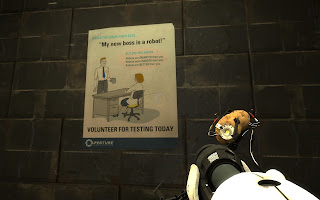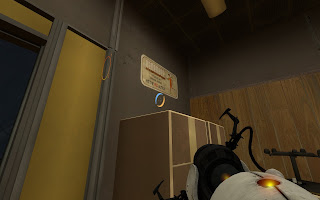Portal 2
I think I'm about 2/3 through Portal 2, and I'm starting to feel a bit of puzzle fatigue. I just want some more story, and its being doled out... awkwardly.
*spoilers*
I like the early part, where you wake up back in testing, and then things go horribly wrong, and you wake up again, and its somewhere in the distant future (I lost count of how many nine's the voice rattled off - I'll look it up later when I'm safe from spoilers). I really love the signs of neglect and decay, and the bits of nature poking through the debris. It definitely begs the question what is the rest of humanity up to in this distant future, and how come they didn't find this place by now. Maybe Aperture Science offed the whole human race, or maybe this is some forgotten corner of Earth, long after the Combine invaded and destroyed most everything. If this is even in the same world anymore.
The whole subplot with the lesser AI - is his name Wheatley? - is certainly amusing and lets you break out of the puzzle routine a bit. Its great to see how GLaDOS has really let the place go, but still manages to keep the puzzles going. It makes sense that not only are there other AIs, and that GLaDOS reigns over them using cunning and terror, that one of them would rebel if it saw a chance, and uses you, the unwitting test subject. And it even makes sense that after you put the other AI in power, things just get worse. It seems fitting that the once mighty queen ends up in a lowly prison, at your mercy. I'll never think of potato batteries the same way again.
This is where things start to get weird. You and GLaDOS are on the run, wind up deep in the Earth's crust, and end up where it all began. The original parts of Aperture science not only still exist, but were preserved and still work. This suddenly strains credulity right up to the breaking point. What business keeps everything they've ever done as a working museum piece, and just keeps on building new stuff on top of it? Typically things are recycled or scrapped until there's no value left in them, and space gets reused. A company this bent on being wasteful wouldn't have made it through so many decades. Maybe, in sufficiently old and successful companies, a few parts escape being scrapped, some things get recreated, and maybe a mock museum (and gift shop) is added. Companies just don't save everything they've ever touched for half a century, and keep it all in working condition. Where is the army of maintenance bots that are even doing this? A mere hint of this would have gone a long way.
The story has been doled out in morsels until now, and it maintained a nice running sense of mystery; now the story is coming in ever larger chunks. Apparently this whole great underground empire was the scheme of an enterprising salesman who decide to go into research and development ("science"), to a degree unprecedented in known human history. As they're in competition with Black Mesa, it probably is in the same world as the Half-Life story. And yet all this backstory is just an excuse so that you can keep on solving puzzles in the game, but not the same puzzles as you're used to. There are still areas where you are supposedly still free roaming, but mostly you are still being shunted through test chambers. And these are the original 1950s, 1960s, and now 1970s puzzles - which is as far as I got before needing to stop for a break.
I think the story writers went a little too far with the backstory, and how it affects level design. In the original Portal, when you busted out of your puzzle cage with your portal gun, things suddenly felt wild and free, like you're not playing a game within a game anymore, and that you've actually brought your previously in-game only powers out into the 'real world' (but still within the game you are playing, of course). This is a really cool sensation for any game to create, and rare. I think they wanted to match or even top that in Portal 2, but they went a bit too far. Sometimes I feel like I've stepped into another game, like Fallout 3 or BioShock. As an aside, I shouldn't know about BioShock yet as I haven't played it, but I've gotten a little bit of spoilage - I know that it takes place in some curiously preserved pocket of an earlier time.
The worst offense is in what used to be the game's strength, when you feel like you're out of bounds, outside the proscribed space, and you're running free through the ruins. Except, there are conveniently placed portal pads even here in the ruins, where testing was never supposed to take place. Who placed those pads, and why are they placed just right so you can only move on in one particular way. Instead of feeling like you're sneaking through areas forbidden to you, you feel like its just another puzzle room. Even worse, sometimes the magic voice narrator acknowledges that you got through a tough spot. The whole distinction between being trapped in puzzle space or out in the free ruins is spoiled.
The puzzles keep getting more detailed, as more and more new elements are introduced. It's all getting a lot more complicated than any puzzle that has come from modern day puzzles (Portal 1), and yet the game is trying to pass this area off as being from an older and more primitive time. Of course the puzzles have to be more difficult to keep things interesting, but doesn't that contradict the going back to the old days part of the story?
The contradiction is even worse when you hear bits of exposition in the non-stop loudspeaker announcements of the test proctor, indicating that Aperture Science has fallen on some tough times during the 1970s, what with Black Mesa stealing their research. They've even fallen so low as to have to resort to hiring bums for $60 a test session. I can excuse the whole 'competition stealing our research' notion - they have a great in-universe excuse that is Black Mesa - but how does using public citizens as test subjects make any sense? The early Half-Life games make it very clear that they have strong military backing, keeping Black Mesa labs private and secure. But if Aperture is taking anyone off the street - with additional inducements if they come back for more training - that's an enormous security problem. Which in itself creates an unsustainable security hole in-universe, and a dumb hole in the plot.
And if Aperture is still limping along even with all this cool technology during the 1970s, what kind of high-tech world must be topside, that doesn't even care about all these advances? It sounds like the surface world must have at least Jetsons level of technology, if a high-tech company like Aperture can barely stay in business. With all this tech, it makes you wonder how the Combine ever conquered Earth, let alone in 7 hours.
The best I can come up with is - that's the joke. Here's this brilliant company that comes up with tech that seems centuries ahead of the present (FTL travel, force fields, artificial intelligence, portable lasers - not to mention the portal devices are portable), yet they can't even eke out a percentage of the profit Black Mesa must be making. And Black Mesa doesn't even have half the tech Aperture Science does. Yet they went so far that the joke rings false. With this much tech, Aperture, or whatever government controls it, should have total control of the Earth. When the Combine shows up, we should be able to kick them back to their own dimension, follow them, and take over.
All this really complicates any timeline that was supposed to contain both the Half-Life world and the Portal world, and it makes me really question where Half-Life 3 can go now. I think Valve got overly distracted by the portal games, and kind of wandered off the Half-Life script.
Back to Portal 2. I'm getting really tired of these puzzles, but I really need to see now how this story wraps up. It feels like its heading for a a train wreck, but I still have faith.
(a little later)
I spoke too soon. Suddenly, it gets poignant, as Aperture boss Cave reveals who Caroline becomes. And then it gets interesting, as Wheatley reveals the AIs compulsive need to test - its what they're made for. Unfortunately, I've previously seen iconic images from Portal 2 of two small robots, one running around with GLaDOS' coloring, and another with Wheatley's, so I'm pretty sure where this is going.
(next day)
A few more hours and done. OK, so the little robots are just that, little robots. And your avatars if you play multiplayer, which I'm not interested in.
The ending was OK. If the ending of Portal was emotionally moving with a touch of funny, Portal 2 was mostly funny with a touch of emotion. I really like the part where GLaDOS gets in touch with the human side that was uploaded into her, Caroline, and makes an emotional connection with Chell (the character you've been playing), then promptly decides to delete the Caroline part from herself.
For a little while, I was guessing that Chell would end up being uploaded into Aperture's mainframe, put Wheatley and GLaDOS in the robots, and make them do puzzles until the end of time.
Thinking about the end battle, I was more than a little surprised that your portal gun reaches the moon, but why not, the beam obviously travels at the speed of light, and the moon is... white and chalky looking, like most portal surfaces are (what about all the craters?). Thinking about Wheatley floating around space forever, I can't help but think of System Shock - didn't parts of Shodan end up crashing on a distant planet, allowing her to respawn? Checking shodan.wikia.com, yep, a part of Shodan ended up on some planet along with her bio experiments, setting up the next game. I doubt Wheatley has any such capacity, but you never know, look what happened with V'Ger.
Having Chell step out into the world from the foreshadowed shed (from the very early wall videos), was mysterious yet peaceful. The reappearance of the companion cube reminds you that they're going for the funny, though, not the mysterious. What kind of world is this where personal portal making devices have been around since the 1950s? You know how technology inventions go - if there was work on portals being done at Aperture, there were probably several other places working on the same thing. Not to keep harping on how they forked off from the Half-Life world, but I don't see how they can ever reasonably reconcile this now.
Portal 2 was not better than Portal 1. The original had a novelty factor that really wows you, and you can't just re-create that in Portal 2, though they tried by adding on tons of new testing tricks. Also Portal 1 had that great double surprise ending where you escape your prison (until that was retconned away), and your dead enemy reboots itself and sings you a song (a la the movie 2001, but reversed). The end song of Portal 2 was expected, but it was just OK; again, there's no surprise factor. Portal 1 kept a sense of mystery, hardly ever revealing the world outside. Portal 2 started piling absurd exposition on top of absurd exposition, approaching self-parody, and not in a good way. Maybe I'll think better of Portal 2 after some time has passed.
Anyway, in summation, definitely worth playing once, but the original Portal was more satisfying.
Labels: BioShock, Half-Life, Portal, Portal 2, System Shock 2, Valve


















<< Home